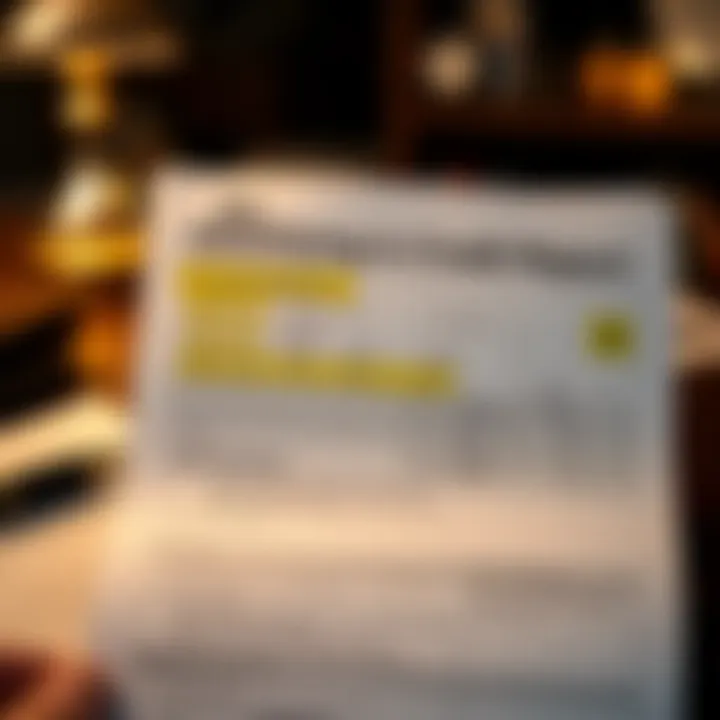How to Resolve Credit Disputes Using Credit Karma


Intro
Understanding how credit works can feel like navigating a maze. When discrepancies pop up in credit reports, it can turn that maze into a minefield. Keeping one's financial health intact is crucial. Accurate credit reporting impacts loan approvals, interest rates, and even job opportunities. For many individuals, platforms like Credit Karma become a lifeline. This article will delve into the art of from contact with credit bureaus to resolving the issues efficiently using Credit Karma.
Identifying inaccuracies promptly can save a person thousands. It is essential to have clear strategies in place to handle these disputes, ensuring minimal stress and maximum effectiveness. Financial literacy is not just a buzzword; it’s a necessity in today’s world.
Key Concepts and Definitions
To get started, let's clarify some important terms around credit and disputes.
- Credit Report: A detailed report of an individual’s credit history, including credit accounts, payment history, and any inaccuracies.
- Credit Dispute: A formal challenge against an item in one’s credit report that is inaccurate or misleading.
- Credit Bureau: Organizations that collect and maintain individual credit information. The major ones are Experian, Equifax, and TransUnion.
Understanding these concepts sets the stage for navigating disputes effectively. If a report is riddled with errors, it can drastically affect a person’s lifestyle and financial goals. Knowledge is power.
Importance of Accurate Credit Reporting
Mistakes in credit reports are more common than many realize. According to a study conducted by the Federal Trade Commission, one in five consumers have errors in their credit reports. This makes understanding how to dispute inaccuracies vital.
When those errors are not addressed, the repercussions can trickle down. Higher interest rates on loans, denied mortgages, and increased insurance premiums are among potential outcomes. Therefore, maintaining an accurate credit report is just as crucial as building credit.
"If you don’t take control of your credit report, you might find your financial options limited later on."
The Dispute Process with Credit Karma
Credit Karma empowers users to be proactive about their credit health. The following steps outline how to use the platform when facing inaccuracies:
- Sign Up or Log In: Creating an account on Credit Karma is straightforward. Users can access their credit reports for free.
- Review Your Report: Take the time to go through the report carefully. Look for any discrepancies or accounts that don’t belong to you.
- Initiate a Dispute: If an error is identified, Credit Karma provides an option to dispute directly via the platform. Users will need to fill out a simple form that details the inaccuracies.
- Monitor Updates: After submitting a dispute, the credit bureau will investigate. Credit Karma can also provide updates on the status of your dispute.
This process may seem uncomplicated, but persistence is key. Sometimes it takes several rounds of communication with credit bureaus to ensure an error is corrected.
Common Pitfalls in Disputing Errors
Navigating disputes can come with its own set of challenges. Here are some common missteps to avoid:
- Ignoring Notifications: Once a dispute is submitted, consumers might overlook communications from credit bureaus. Timely responses are crucial.
- Inadequate Documentation: Failing to provide necessary documents can stall a dispute. Keep records of communications and any corroborative evidence.
- Being Uninformed on Rights: Consumers have rights under the Fair Credit Reporting Act. Understanding these rights can aid in advocacy.
Staying informed and vigilant about one's credit report can prevent numerous headaches down the line. Remember, good credit isn’t just about borrowing; it’s about being empowered in financial decisions.
Epilogue
Credit disputes may seem daunting, but platforms like Credit Karma can demystify the process. By understanding the nuances of credit reporting and being proactive, individuals can clear inaccuracies and protect their financial futures. The path to maintaining credit health is long, but with diligent monitoring and swift action on disputes, the journey can be navigated with greater ease.
For more information, visit Credit Karma or the Federal Trade Commission website.
Keep your credit in check, and don't let inaccuracies linger!
Understanding Credit Reports
Credit reports serve as a window into an individual’s financial history, playing a pivotal role in shaping one's creditworthiness. It’s crucial to understand credit reports, especially when navigating the often tricky waters of credit disputes through platforms like Credit Karma. A well-informed user is better equipped to spot discrepancies and take action when necessary.
What is a Credit Report?
At its core, a credit report details an individual’s borrowing and repayment history. It is compiled by credit bureaus, which gather information from various financial institutions. When lenders evaluate your creditworthiness for loans or mortgages, tipping through the petal of your credit report helps them make informed decisions. Not only does it highlight your financial behavior, but it also lays bare your reliability as a borrower.
Components of a Credit Report
Understanding the components that make up a credit report is instrumental in identifying errors or inconsistencies. Here’s a breakdown of its key parts:
Personal Information
The personal information section includes your name, address, and Social Security number. It’s foundational since, without accurate personal information, the rest of the report risks losing integrity. A glance at this section is usually the first step when checking for errors. For instance, if a previous address appears, or if your name is misspelled, it can lead to confusion down the line, especially if identity theft is involved. The key characteristic of personal information is that it builds the framework for your credit identity.
Credit Accounts
Credit accounts encapsulate the loans, credit cards, and other financial products you've taken out. Each account reveals important details about the lender's name, credit limit, and terms of repayment. The unique feature of credit accounts is their varied impact on your credit score. For example, having a mortgage may boost your score due to its importance in long-term financial health, while unpaid credit cards can sink it in no time. Knowing how these accounts function within your report helps illuminate their direct connection to potential credit disputes.
Payment History
Payment history is often seen as the heart of your credit report, accounting for a significant slice of your credit score. This section displays how timely your payments have been and whether you have any missed payments or defaults. The key characteristic here is that timeliness is everything; lenders look for consistency. A single missed payment can haunt you for years, but a robust history of on-time payments can be your golden ticket to better lending terms. Snagging a dent in this area can lead to problems when filing disputes, as it creates a narrative about your payment reliability.


Inquiries
Finally, inquiries showcase the instances where lenders have checked your credit report, either via hard or soft inquiries. A key characteristic of inquiries is that they can signal risk; too many checks raise a red flag. Lenders might wonder why you're seeking credit so often or why you have recently applied for multiple accounts. Understanding how inquiries are processed and reported helps contextualize your credit persona as you navigate disputes. Knowing when inquiries negatively impact your score can be crucial when you find yourself in a dispute situation.
Understanding these core segments of your credit report is imperative. Not only do they guide you to detect errors, but they also empower you to address potential discrepancies efficiently.
The Importance of Accurate Credit Reporting
Accurate credit reporting serves as the backbone of any healthy financial life. Credit reports aren't just mere documents; they play a pivotal role in determining an individual’s borrowing power. When these reports contain errors, it can have rippling effects on one’s financial standing. Not only can inaccuracies lead to higher interest rates, but they can also thwart applications for loans, credit cards, or even rental agreements.
Effects on Financial Standing
Having an accurate credit report can be likened to a good umbrella on a rainy day — it shields a person from potential downpours of financial strain. Look at it this way: if your credit report displays incorrect information, your credit score could take a hit.
- Higher Interest Rates: A lower credit score often translates to lenders charging you more in interest. For instance, if you are shopping for a mortgage and your score is understated due to an error, you may end up paying hundreds or even thousands more over the life of the loan.
- Loan Applications Denied: Think about the disappointment of getting turned down for a loan. Failed attempts can lead to multiple credit inquiries, further impacting your score negatively.
- Insurance Premiums: Believe it or not, some insurance companies use your credit history to determine premiums. A negative report could result in inflated costs for auto or home coverage, making you pay more than necessary.
"A single error on your report can lead to serious financial consequences that can take years to rectify."
Being aware of the potential pitfalls crafted by inaccurate reporting can save both time and money in the long run. Regular monitoring ensures you are not caught off guard when you really need to lean on your credit.
The Role of Lenders
Lenders are particularly sensitive to the accuracy of credit reports. They rely on these reports to gauge the risk of lending money to individuals. If a lender sees discrepancies in a consumer's credit history, this can introduce doubt — after all, lending is a gamble at heart.
- Confidence in Assessment: When credit reports are accurate, lenders feel more confident in their assessment of risk. They can make informed decisions and offer better terms to borrowers, creating a win-win scenario.
- Feedback Loop: When errors get disputed and corrected, it not only helps the individual consumer but also adds to the integrity of the credit reporting system. Lenders involved in the review process can gain valuable insights into the reliability of the information at hand.
- Fair Lending and Evaluation: Ultimately, accurate credit reporting holds all players accountable in the financial system. It fosters a more equitable environment, allowing individuals from various backgrounds to access credit without unnecessary barriers.
In summary, the stakes of accurate credit reporting are immensely high. Errors can lead to various financial complications that affect individuals' purchasing power, which in turn can impact the larger economy. Monitoring your credit through tools like Credit Karma can help in identifying these issues quickly, ensuring your financial life remains on the right track.
Foreword to Credit Karma
When it comes to navigating the world of credit, having the right tools can make all the difference. Credit Karma stands out as a valuable resource, helping users keep tabs on their financial reputation. Its significance not only lies in its ability to furnish credit scores but also in the comprehensive services it provides to effectively manage credit disputes.
Credit Karma has evolved into more than just a credit score provider; it plays a pivotal role for individuals looking to enhance their credit health. The platform's user-friendly interface and insightful resources make it an essential tool for financial enthusiasts and individual investors alike. Here’s a breakdown of what this service offers and how it can be instrumental in disputing inaccuracies on credit reports.
Overview of Credit Karma's Services
Credit Karma is like a best mate in the world of finance, offering a suite of services designed to demystify credit. At its core, it provides free access to credit scores and reports, which are vital starting points for anyone looking to monitor their credit status. Here are some critical features:
- Credit Monitoring: The platform alerts users to changes in their credit reports. This real-time monitoring is crucial for spotting fraud or inaccuracies.
- Credit Score Simulator: This unique tool helps people understand how different financial decisions might affect their scores. Users can experiment with scenarios to see potential outcomes before taking action.
- Financial Products: Credit Karma also matches users with various financial products tailored to their credit profiles. This can include credit cards and loans, making it easier for individuals to find options that suit their needs.
Using Credit Karma for Credit Monitoring
Using Credit Karma for credit monitoring is pretty straightforward. Once a user creates an account, they gain elementary access to their credit reports from the two major credit bureaus—Equifax and TransUnion. This allows users to view their credit history, including accounts, inquiries, and payment information, all in one place.
- Regular Updates: Credit Karma updates users with their scores weekly. This keeps them in the loop about any significant changes, giving a sense of control over one’s credit situation.
- Alerts for Significant Changes: Users receive notifications when there are changes in their credit reports. Whether it’s a new account opened in their name or a missed payment, staying informed is key to managing and resolving disputes quickly.
- Educational Resources: The platform doesn't stop at just monitoring; it provides users with a wealth of articles and guides to help them understand their credit better. These resources can offer tips on improving credit scores or navigating complex financial situations, giving users a fair shake at their credit journey.
Identifying Errors in Your Credit Report
When you pull up your credit report, almost like taking a snapshot of your financial life, it's vital to sift through it carefully. Errors can truly wreak havoc on your financial health. Identifying inaccuracies in your credit report isn’t just a good idea; it’s essential for preserving your financial reputation and ensuring you can access credit on favorable terms. All too often, people overlook or misunderstand the significance of these discrepancies until it’s too late. In the end, knowing how to spot and challenge these errors can save you not just money but also your peace of mind.
Common Credit Report Errors
When examining your report, several common errors tend to pop up. Here they are:
- Misspelled Names: A simple typo can lead to mismatched accounts.
- Wrong Social Security Number: Even a single digit off can lead problems down the line.
- Incorrect Account Status: You might see accounts marked as delinquent or closed when they are not.
- Duplicate Accounts: Sometimes, accounts can appear more than once, especially in case of name changes or other personal details.
- Outdated Information: Items that should have fallen off after seven years may still linger in your report, dragging your score down.
These errors don’t just inconvenience you; they can result in higher interest rates or even denials for loans and credit. Don’t underestimate the real-world impact of erroneous information.
How to Spot Inaccuracies
Recognizing these inconsistencies involves a thorough approach:
- Obtain Your Report: Pull your credit report from major credit reporting agencies such as Equifax, Experian, or TransUnion. You can access these for free once a year at AnnualCreditReport.com.
- Verify Personal Details: Make sure your name, address, and social security number are correct. Pay attention to any variations in your name, as they may indicate mixed files.
- Examine Each Credit Account: Check each account for accuracy. Look into the opening dates, credit limits, and payment histories. Are they correct?
- Pay Attention to Inquiries: Review hard inquiries to see if you recognize them, as unauthorized inquiries can be a red flag.
"A mistake in your credit report is like a mosquito in your ear: annoying and disruptive."
- Make Notes: Keep track of any errors so you can address them during the dispute process.
- Compare Reports: If possible, check reports from multiple bureaus. Sometimes, one bureau might have errors that others don’t.
Taking these steps — though they might seem tedious — helps you catch issues before they escalate. Paying close attention could be the deciding factor in securing a loan at the best possible rate or, conversely, being turned down due to someone else’s mistake. Your creditworthiness is too important to leave to chance.
Filing a Dispute with Credit Karma


Filing a dispute with Credit Karma can be a crucial step in maintaining your financial health and ensuring the accuracy of your credit report. The implications of a flawed credit report are significant; they can affect loan approvals, interest rates, and even housing opportunities. By initiating a dispute through Credit Karma, individuals gain an efficient mechanism to challenge inaccuracies and advocate for their financial standing.
This platform simplifies an otherwise daunting process, empowering users with tools that allow for effective monitoring and resolution of credit discrepancies.
Steps to Initiate a Dispute
Initiating a dispute might seem like a Herculean task, but it can be broken down into manageable steps. Here’s how to get the ball rolling:
- Log Into Your Account: Begin by signing into your Credit Karma account. If you’re new, you may need to create an account, which is straightforward and requires minimal personal information.
- Navigate to Your Credit Report: Access your credit report through the dashboard. Pay attention to any inaccuracies that catch your eye, whether it’s incorrect personal information or unfamiliar accounts.
- Select the Item to Dispute: Click on the specific entry you believe to be incorrect. Each entry typically has an option to dispute, so look for that button or link.
- Provide Details: Here, you’ll need to provide a brief explanation of why you’re disputing the information. Be concise but detailed enough to ensure your point is clear.
- Submit the Dispute: After filling in the necessary details, submit your dispute. You should receive a confirmation that Credit Karma has received your request, and you may begin to receive updates as the process moves forward.
Following these steps can provide clarity and direction in an otherwise overwhelming situation. Remember, this isn't just about resolving a number; it’s about reclaiming your financial peace of mind.
Required Documentation
When filing a dispute, having the right documentation is like bringing a knife to a gunfight—essential. This documentation supports your claims, enhancing the chances of a successful resolution. Here’s what you might need:
- Identification: Collect a government-issued ID, such as a passport or driver’s license, to verify your identity.
- Credit Report Copy: Having a printed copy of your credit report helps to contextualize your dispute, allowing you to point directly to the errors in question.
- Supporting Evidence: Any correspondences, receipts, or proof that counteracts the inaccurate entry should be included. This might involve bank statements, payment confirmations, or letters disputing collection actions.
- Dispute Letter: Though many platforms allow for disputes to be submitted electronically, having a written letter can serve as an additional reference, detailing your case in a formal manner.
By gathering these documents, you not only protect your side of the story but also ensure that your dispute is taken seriously and handled swiftly.
"Credit reports can tell many stories, but it’s up to you to ensure yours is accurate."
Maintaining accuracy in your credit report through Credit Karma isn’t just about correcting errors; it’s about setting the stage for your financial future. Remember, every detail counts, and taking the time to file a thorough dispute can save you headaches later on.
Understanding the Dispute Process
Understanding the process of disputing inaccuracies in your credit report is crucial for anyone aiming to maintain a solid financial standing. Without a clear grasp of this process, you could find yourself tangled in bureaucratic red tape, potentially prolonging or complicating the resolution of your credit issues. In this section, we will delve into the nitty-gritty of how disputes work, emphasizing the timeline and key expectations.
The dispute process marks a pivotal moment in ensuring your credit reporting is not just accurate but a true reflection of your financial behavior. It involves verifying the correctness of the entries in your report and rectifying any discrepancies found. When you embark on a dispute through Credit Karma, understanding the nuances can not only alleviate stress but also help you avoid potential pitfalls.
One of the primary benefits of understanding this process in detail is improved efficiency. If you know what steps to expect, you can prepare ahead of time, steering clear of common stumbling blocks. Moreover, being informed allows you to advocate for yourself effectively when dealing with credit bureaus or creditors. This self-advocacy is not just beneficial; it's sometimes necessary, especially in today's increasingly automated dispute landscapes.
Through this discussion, we'll explore the timeline of a dispute, covering everything from when you file to when you can expect a resolution. Additionally, we'll paint a clear picture of what the resolution process looks like, allowing you to stay ahead of the game.
"Knowledge is power, especially when it comes to navigating the complexities of credit disputes."
Timeline of the Dispute
When you initiate a dispute, it’s imperative to have a timeline in mind. Typically, once you’ve submitted your dispute through Credit Karma, the clock starts ticking. According to the Fair Credit Reporting Act (FCRA), credit bureaus are generally required to investigate any disputes within 30 days. However, that is just the beginning.
Here’s a simplified sequence to give you an idea of what to expect:
- Initiation: Filing your dispute through Credit Karma is the first step. Here, you’ll submit all the necessary details regarding the inaccuracies you found.
- Confirmation: Within a few days, Credit Karma should confirm receipt of your dispute. This step is often quick, yet it’s crucial to ensure they have your claim on record.
- Investigation: The bureaus will commence an investigation, which should be completed within 30 days. During this period, they will reach out to the data furnishers (i.e., lenders) for verification.
- Results: After the investigation concludes, you will receive the results of the dispute. If your dispute is found valid, corrections will be made to your credit report.
- Follow-Up: Should your case end in a resolution against your favor, you still have options for follow-up. You may consider filing a re-dispute or seeking a more formal complaint based on the findings.
The timeline serves as a roadmap, helping you track where you are at any given point. However, patience is key. Even after the initial irritation of finding an error, understanding the timeline can help you keep your calm.
What to Expect During Resolution
During the resolution phase, several outcomes might unfold, and it’s crucial to be mentally prepared for each possibility.
- Outcomes: The resolution could either affirm your original report—which could be disappointing—or reflect the adjustments you were hoping for. If your claim proves accurate and relevant, changes will typically appear on your credit report, provided the data furnishers act promptly on their findings.
- Communication: Expect some communication throughout this phase. Credit Karma and the credit bureaus often keep you updated, so look out for notifications regarding the progress of your dispute.
- Persistence: If your dispute does not resolve in your favor, this isn’t the end of the road. Be ready to gather additional documentation, or find follow-up avenues for presenting your case again.
- Credit Report Update: When your dispute is resolved, always double-check your credit report for updates. Sometimes, changes may not be instantaneously reflected in your report. You might have to take a proactive approach here.
By having clarity around the resolution expectations, you stand a greater chance of navigating this process with grace and confidence. Every bit of effort you put into understanding these nuances can significantly pay off in protecting your credit standing.
After Filing a Dispute
Once you’ve taken the step to file a dispute, it’s essential to stay actively engaged in the process. This phase not only concludes the initial action but also sets the stage for monitoring potential changes and understanding the overall impact on your credit profile. Knowing what to do after filing a dispute can make a significant difference in your financial health and peace of mind.
Monitoring Changes to Your Report
Monitoring your credit report after filing a dispute is crucial. You want to keep a watchful eye on any updates or modifications that happen. Here’s why:
- Real-Time Alerts: Credit Karma provides notifications when there are changes to your report. These alerts can inform you about the results of your dispute and any other shifts that might affect your credit score.
- Reviewing Updates: After a dispute, the credit bureaus have a limited time to investigate and respond. Frequent checks can help you catch results faster. You might see a positive change where an error has been corrected, or you might face an indication that your dispute was denied.
- Impact on Credit Score: Tracking your score allows you to see how resolutions play out. If errors are corrected, you might see an uptick in your score. On the contrary, if inaccuracies are upheld, understanding your score’s fluctuations can guide you in planning your next steps.
To make sure you’re fully aware of your credit standing:
- Utilize Credit Karma’s tools for monitoring your score.
- Subscription services from major credit bureaus can also give detailed insights.
Understanding the Outcome
Understanding the outcome of your dispute is just as essential as the submission process. An effective approach involves:


- Expected Timeline: Typically, after submitting a dispute, expect a response within 30 days. This can feel like waiting for the kettle to boil, but patience is necessary.
- Types of Outcomes: You might receive a few possible outcomes. The main types include:
- Correction Made: Your report will reflect the updates, and potentially your score will improve.
- No Change: Sometimes, the credit bureau decides the initial information provided was accurate. In this case, don’t fret; there are options available for further action.
- Incomplete Results: Occasionally, a dispute may end with partial information being addressed. This situation often awaits additional documentation from the consumer.
To handle your outcome knowledgeably:
- Carefully read all communications from the credit reporting agencies. They will detail their decision-making process and provide insight into why your dispute was resolved in a certain manner.
- Reach out to Credit Karma for guidance on what to do next if your issue is unresolved.
"It’s not just about filing a dispute; understanding the implications of the outcome is where the real journey begins in maintaining a solid credit profile."
This phase demands diligence and understanding. Regularly checking your report for updates along with thoroughly grasping the resolution will prepare you better for any necessary actions moving forward.
Common Pitfalls When Disputing Credit Issues
When it comes to disputing credit discrepancies, awareness of potential pitfalls can save time and effort. Many individuals underestimate the complexity of the process, not realizing that small oversights can lead to significant delays or negative outcomes in the dispute resolution journey. Missteps can arise from a lack of thoroughness, and understanding these common traps is crucial for ensuring a successful dispute process. Navigating these pitfalls can bolster one's credit health and prevent further complications, allowing for a swifter resolution that ultimately aids financial goals.
Invalid Information Disputes
At the heart of a successful dispute lies the need for accurate and validated information. Many consumers protest against information on their credit report without first ensuring that the inaccuracies are genuinely invalid. For instance, if a lender shows a late payment that the consumer believes is inaccurate, it is vital to verify the timing and accuracy before filing a dispute. If there's no substantial evidence backing the claim, the dispute can fall flat.
This misstep often revolves around misunderstanding the nuances of documentation. Users sometimes hastily assume they don’t owe a debt, when in fact, it has just been misplaced or marked wrongly by the credit bureau. Before initiating a challenge, it’s good practice to gather all related information, such as payment receipts or communication with creditors. Arriving at the dispute stage with an informed stance markedly improves one's chances of a favorable outcome.
Incomplete Documentation
One of the most detrimental mistakes individuals make is submitting their dispute with insufficient documentation. The credit bureaus need comprehensive evidence to verify claims. If a user argues that a particular debt is incorrect, they need to provide sufficient proof. This could include things like bank statements, previous correspondence, and any other relevant financial documents.
When documentation is incomplete, the dispute may end up as a non-starter. Credit agencies typically respond to issues in matters of weeks, but that timeline can stretch if the proper supporting documents aren’t submitted. Ensuring that every claim is backed by strong, clear paperwork can streamline the process.
Accurate and complete documentation is crucial. It can make or break your case when disputing credit report errors.
In wrapping up this section, be aware that these common pitfalls when disputing credit issues aren't just small bumps along the road. They can turn into massive roadblocks if not addressed accordingly. Each choice made during this process holds weight in determining the outcome. Being diligent, organized, and prepared is your best approach; thereby pushing towards achieving a credit record that reflects true performance and reliability.
For further reading, check out Consumer Financial Protection Bureau for valuable insights on credit disputes.
Also, visit Credit Karma for tools and resources that aid in monitoring your financial health.
Best Practices for Maintaining Credit Health
Maintaining robust credit health is crucial not just for securing loans but also for numerous financial undertakings. Good credit can save you money in the long run, especially when it comes to obtaining favorable interest rates. On the flip side, keeping a low credit score can hinder your financial options, making it imperative to follow certain best practices.
Regular Monitoring of Credit Reports
One of the most effective ways to ensure healthy credit is through regular monitoring of your credit reports. This process entails routinely checking your reports from all three major credit bureaus: Equifax, Experian, and TransUnion. While you can get a free report once a year from each bureau through AnnualCreditReport.com, make it a habit to check your report more often.
Why is this so important?
- Spot Errors Early: Discrepancies might crop up that could harm your score. If a lender incorrectly reports your payment history, for example, and you don’t catch it, you could be facing higher interest rates when applying for loans.
- Response to Identity Theft: Regular checks can also help you detect if your identity has been stolen. Seeing unfamiliar accounts or inquiries can be your first alert.
- Understanding Trends: Monitoring your credit can help you identify trends, such as increasing debts or late payments, allowing you to reshape your financial habits promptly.
Utilizing tools like Credit Karma can simplify the monitoring process by providing insights and alerts on your credit status. Remember, knowledge is power. Knowing where you stand can help you make informed decisions about your finances.
Understanding Credit Utilization
Another paramount aspect of credit health is managing your credit utilization ratio. This ratio measures how much of your available credit you are using. The general rule of thumb is to keep this ratio below 30%.
Here’s why it matters:
- Affecting Your Credit Score: High credit utilization can signal to lenders that you might be overly reliant on credit, which can lower your credit score. Conversely, a lower ratio shows that you are managing your credit responsibly.
- How to Calculate: To find your credit utilization ratio, divide your total outstanding credit card balances by your total credit limits. For example, if you have $5,000 in balances and a total credit limit of $20,000, your utilization ratio is 25% ($5,000 ÷ $20,000 = 0.25).
- Practical Steps: If your utilization ratio is soaring, consider strategies such as paying down existing debt, requesting a credit limit increase, or opening a new credit account judiciously. Each of these steps requires careful planning and an awareness of how they might impact your overall financial health.
Credit health isn't just about numbers; it’s about having the right practices in place to maintain a stable and flourishing financial life. Implementing these thoughts and reflecting on your spending habits can pave the way for enhancing your credit score journey.
"Credit health is a marathon, not a sprint. Consistency and awareness are key."
In summary, regular monitoring and understanding of credit utilization are just two pieces of the larger puzzle. Following these practices can ultimately place you in a better position to manage your credit and navigate any disputes that may arise in the future.
Ending
In tackling the complexities of credit disputes through Credit Karma, it becomes abundantly clear that this process is more than just a matter of numbers on a report. Ensuring that your credit report accurately reflects your financial behavior is essential. A blemish on this often-misunderstood document can affect your financial future in significant ways, from interest rates on loans to employment opportunities.
Credit disputes are not merely administrative tasks; they require a deep understanding of the elements involved. By utilizing platforms like Credit Karma, users gain access to vital information that can illuminate discrepancies and inaccuracies. It's the digital age approach to financial management—one that educates and empowers.
Here’s what stands out from our discussion:
- Knowledge is Power: Recognizing how your credit report works and what errors may look like can save you from greater financial headaches down the line.
- Proactive Measures: Regularly monitoring your credit—through Credit Karma or similar resources—enables you to catch problems early, avoiding potential impacts on your credit score.
- Effective Dispute Filing: Knowing the steps to file a dispute effectively and the documentation required can streamline the process, ensuring a higher likelihood of success.
One cannot underestimate the importance of being vigilant about one’s financial documents. The path to resolving credit issues may twist and turn, but it ultimately leads towards a better understanding of financial health and the importance of having accurate reporting. Navigating this terrain with awareness and strategy can greatly enhance your overall financial well-being.
"A journey of a thousand miles begins with a single step." — Lao Tzu
Closing thoughts on credit disputes should emphasize that a proactive approach will serve you well. Mistakes can happen, and while they can be frustrating, having the right tools and knowledge at your disposal makes resolving them a more manageable task. Investing the time to understand your credit report and knowing how to dispute inaccuracies effectively could be the difference that safeguards your financial future.















